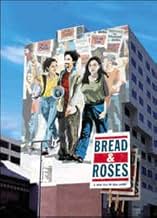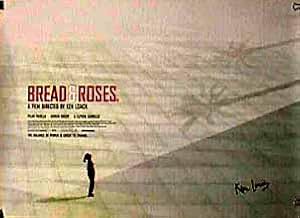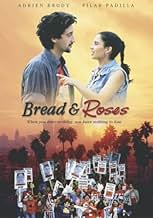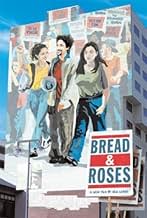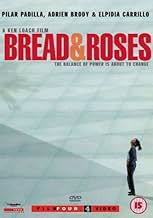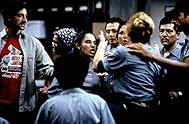IMDb-BEWERTUNG
7,0/10
6312
IHRE BEWERTUNG
Zwei lateinamerikanische Schwestern arbeiten als Putzfrauen in einem Bürogebäude im Stadtzentrum und kämpfen für das Recht, sich gewerkschaftlich zu organisieren.Zwei lateinamerikanische Schwestern arbeiten als Putzfrauen in einem Bürogebäude im Stadtzentrum und kämpfen für das Recht, sich gewerkschaftlich zu organisieren.Zwei lateinamerikanische Schwestern arbeiten als Putzfrauen in einem Bürogebäude im Stadtzentrum und kämpfen für das Recht, sich gewerkschaftlich zu organisieren.
- Auszeichnungen
- 5 Gewinne & 10 Nominierungen insgesamt
Frankie Davila
- Luis
- (as Frank Davila)
Eloy Méndez
- Juan
- (as Eloy Mendez)
Empfohlene Bewertungen
As the daughter of hard-working Mexican immigrant parents and having been raised in one of Los Angeles' poorest barrios, I often saw the story of Rosa and Maya being played out in real life within my family and amongst my neighbors. The authenticity with which this story is told is astounding, showing a deep respect for those who in search of a way to make an honest living, subject themselves to countless humiliations and are relegated to live outside the margins of mainstream America.
Kudos to the writers!! This is the first time I have ever seen an American film in which the dialogue in Spanish was written by someone who actually speaks the language and can grasp the nuances and feeling of the language so perfectly. Richard Hicks is to be commended for casting both Elpidia Carrillo and Pilar Padilla in the roles of Rosa and Maya, respectively. They deliver their dialogue, especially in Spanish, with an emotion and passion that is rarely seen on the Hollywood silver screen. Needless to say, Bread and Roses is now on my list of must-have-films to add to my DVD library.
Kudos to the writers!! This is the first time I have ever seen an American film in which the dialogue in Spanish was written by someone who actually speaks the language and can grasp the nuances and feeling of the language so perfectly. Richard Hicks is to be commended for casting both Elpidia Carrillo and Pilar Padilla in the roles of Rosa and Maya, respectively. They deliver their dialogue, especially in Spanish, with an emotion and passion that is rarely seen on the Hollywood silver screen. Needless to say, Bread and Roses is now on my list of must-have-films to add to my DVD library.
When I attended a screening a week ago sponsored by a local public supported radio station (KPFK) in Los Angeles, I was not certain if this film was a documentary or typical crafted Hollywood-style hyperbole since I listened with half an ear while jogging and listening to an opportunity to attend.
Who would have thought that a simple discussion on a local public supported radio station in Los Angeles (KPFK) a few years ago would compel a screenwriter (Paul Laverty) to visit a union organizing effort in downtown Los Angeles (circa 1999) resulting in a film that was drama, comedy, farce, fear, compassion and a taste of dusted immigrants creeping through Tijuana-to-USA shrubs to gain entry via the abusive "coyotes" human smuggler routes. Most of these immigrants land in day-worker situations and low pay and yet Los Angeles would collapse without them. This film concentrates on the downtown office area -- owned and occupied by the elite of Los Angeles establishment - and where many undocumented workers toil under conditions that are far less than that suggested by international Human Rights standards.
This was a polished non-Hollywood-capability-film but yet intimately Los Angeles. I listened to an interview yesterday on KPFK with Laverty and learned that funding was elsewhere - Europe I recall - not 'Hollywood'. And Laverty is from Scotland. One would never guess that the film was actually on the low-budget scale when compared with Hollywood's pleasure to spend big dollars.
I also learned that the film was made in 30-days (hence the vibrant interaction of all cast members and energetic direction by Loach) and is in release this week with 30 prints in Los Angeles, and 300 nationwide USA. Sounds like some symmetry there and potential Lottery pick permutations.
My only reservation is that the story is highly political in an undercurrent nature and may frighten an extensive audience --- unless the viewers just take the courage to go, watch, and enjoy. The film will do the rest. The viewer will leave with more than the cost of a matinee price ticket.
I also suggest that in an upcoming meeting between Vicente Fox, President of Mexico, and George W. Bush, President of United States, that Vicente snag a copy of the film and show it to George while sipping tea in Texas. And then for dessert, sip more tea and watch "Traffic".
Who would have thought that a simple discussion on a local public supported radio station in Los Angeles (KPFK) a few years ago would compel a screenwriter (Paul Laverty) to visit a union organizing effort in downtown Los Angeles (circa 1999) resulting in a film that was drama, comedy, farce, fear, compassion and a taste of dusted immigrants creeping through Tijuana-to-USA shrubs to gain entry via the abusive "coyotes" human smuggler routes. Most of these immigrants land in day-worker situations and low pay and yet Los Angeles would collapse without them. This film concentrates on the downtown office area -- owned and occupied by the elite of Los Angeles establishment - and where many undocumented workers toil under conditions that are far less than that suggested by international Human Rights standards.
This was a polished non-Hollywood-capability-film but yet intimately Los Angeles. I listened to an interview yesterday on KPFK with Laverty and learned that funding was elsewhere - Europe I recall - not 'Hollywood'. And Laverty is from Scotland. One would never guess that the film was actually on the low-budget scale when compared with Hollywood's pleasure to spend big dollars.
I also learned that the film was made in 30-days (hence the vibrant interaction of all cast members and energetic direction by Loach) and is in release this week with 30 prints in Los Angeles, and 300 nationwide USA. Sounds like some symmetry there and potential Lottery pick permutations.
My only reservation is that the story is highly political in an undercurrent nature and may frighten an extensive audience --- unless the viewers just take the courage to go, watch, and enjoy. The film will do the rest. The viewer will leave with more than the cost of a matinee price ticket.
I also suggest that in an upcoming meeting between Vicente Fox, President of Mexico, and George W. Bush, President of United States, that Vicente snag a copy of the film and show it to George while sipping tea in Texas. And then for dessert, sip more tea and watch "Traffic".
Same typical themes handled in Loach's work. I felt something strange, while watching it, maybe the San Diegan locations might be strange to the fans used to seeing English and Scottish cities. Nevertheless I couldn't say the effort of observation and insight doesn't work; the young Mexican gal propelled by the American dream is very believable, the unknown cast acts with passion, expressing the various faces of injustice and biases migrants must endure. However, my final opinion on the movie is that it fails to illustrate the real situations these kind of people live in and their genuine feelings, that is the Ken Loach's peculiarity.
Elpidia Carrillo has a scene in this film equal to the "...I'm the best possible Arnold Burns" self-justification speech in A THOUSAND CLOWNS. It's so real and raw it's almost hard to watch. I saw this film at the Santa Barbara Film Festival, and it so beautifully delivers the drama and the realities of the Justice for Janitors campaign. Ken Loach does it again...with an American accent (ALL the Americas). Adrien Brody is Ron Leibman's NORMA RAE organizer if he were younger and less seasoned, but just as much the true believer. Pilar Padilla's Maya is all passion and youth and fun-loving troublemaker. The documentary style that Ken Loach uses is perfect for the subject.
As Sam Shapiro, a labor activist who helps Hispanic janitors in an L.A. office building to form a union, Brody's blend of earnestness and mischief really livens up this well-meaning, sometimes moving, occasionally didactic Ken Loach film. Brody's beard and bedhead make him look especially cuddly; no wonder engaging heroine Pilar Padilla eventually drags him into a closet for some hot and heavy nookie! :-) (My husband also remarked that all that hair made Brody's prominent proboscis look, well, less prominent -- not that Brody's noble nose ever bothered me, thank you very much! :-).
Wusstest du schon
- WissenswertesPrior to filming, Adrien Brody did undercover research as a union member in Los Angeles. He went to conventions and sat in on strike talks. A couple of the members recognized him, but Brody persuaded them not to blow his cover.
Top-Auswahl
Melde dich zum Bewerten an und greife auf die Watchlist für personalisierte Empfehlungen zu.
- How long is Bread and Roses?Powered by Alexa
Details
- Erscheinungsdatum
- Herkunftsländer
- Offizieller Standort
- Sprachen
- Auch bekannt als
- Brot und Rosen
- Drehorte
- Produktionsfirmen
- Weitere beteiligte Unternehmen bei IMDbPro anzeigen
Box Office
- Bruttoertrag in den USA und Kanada
- 533.479 $
- Eröffnungswochenende in den USA und in Kanada
- 49.662 $
- 13. Mai 2001
- Weltweiter Bruttoertrag
- 706.876 $
- Laufzeit
- 1 Std. 50 Min.(110 min)
- Farbe
- Sound-Mix
- Seitenverhältnis
- 1.85 : 1
Zu dieser Seite beitragen
Bearbeitung vorschlagen oder fehlenden Inhalt hinzufügen



